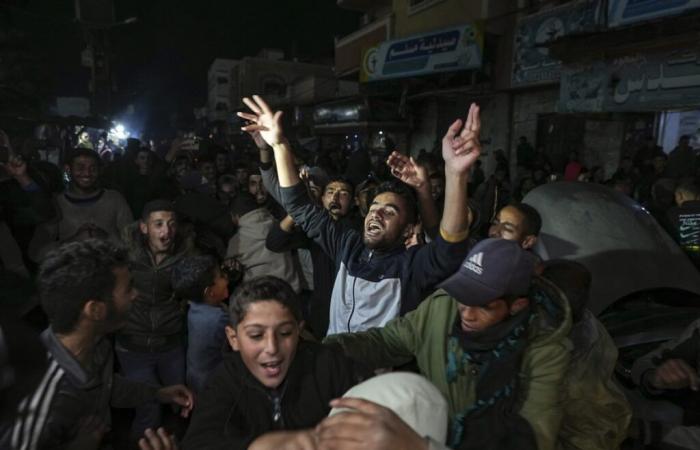Keystone-SDA
Qatar and the United States announced the conclusion on Wednesday of an agreement on a ceasefire in the Gaza Strip and the release of hostages, after more than 15 months of a war between Israel and Hamas which caused tens of thousands of deaths.
This content was published on
January 15, 2025 – 9:16 p.m.
(Keystone-ATS) Israel nevertheless warned that questions remained to be resolved and said it hoped to conclude “tonight”, according to the office of Prime Minister Benjamin Netanyahu.
At the announcement of the agreement, thousands of Palestinians exulted across the besieged Gaza Strip devastated by the war triggered by an attack of unprecedented scale by the Islamist movement Hamas against Israel on October 7, 2023.
The Prime Minister of Qatar, Mohammed bin Abdelrahmane Al-Thani, whose country is one of the mediators in the war between Israel and Palestinian Hamas, announced the entry into force on Sunday of an agreement in several sentences, including the The first will see the release of 33 hostages held in Gaza.
“The agreement will enter into force on Sunday January 19 (…) The first phase of the agreement will last 42 days and will include a ceasefire as well as the withdrawal of Israeli forces towards the east, away from populated areas,” he said at a press conference in Doha.
According to him, “Hamas will release 33 Israeli hostages, including civilian women, as well as children, the elderly, sick civilians and the wounded, in exchange for several prisoners held in Israeli prisons.”
US President Joe Biden said he was “delighted” that the hostages would be released after the Gaza agreement, adding that he had worked “as a team” with US President-elect Donald Trump on the agreement.
Three-phase agreement
“We have a hostage deal in the Middle East. They will be released soon,” announced Mr. Trump, who recently promised “hell” to the region if the hostages were not released before his return to the White House on January 20.
Qatar’s Prime Minister provided further details of the agreement. “Israeli forces will be positioned along the Gaza border, which will allow the exchange of prisoners (…) and the return of the displaced to their homes.”
“Details regarding phases two and three (of the agreement) will be finalized during the implementation of the first phase,” he added.
After more than a year of blockage, indirect negotiations have accelerated in recent days via international mediators – United States, Qatar, Egypt – before Mr. Trump’s return to the White House.
The second phase will concern the release of the last hostages, “soldiers and men of draft age”, as well as the return of the bodies of the dead hostages, according to the Times of Israel.
An Israeli official, however, warned Tuesday that Israel would “not leave Gaza until all the hostages have returned, the living and the dead.”
A single one-week truce was observed at the end of November 2023 and the negotiations carried out since then have been met with intransigence from both camps.
The attack of October 7, 2023 resulted in the deaths of 1,210 people on the Israeli side, the majority of them civilians, according to an AFP count based on official Israeli data. Of 251 people kidnapped on the day of the attack, 94 are still held hostage in Gaza, 34 of whom are dead according to the Israeli army.
At least 46,707 people, mostly civilians, were killed in the Israeli military campaign of retaliation in the Gaza Strip which also caused a humanitarian disaster, according to data from the Hamas Ministry of Health, deemed reliable by the UN .
According to the army, 408 soldiers were killed in combat.
Already undermined by an Israeli blockade imposed since 2007, poverty and unemployment, the besieged Gaza Strip has been ravaged by war and the vast majority of its 2.4 million inhabitants have been displaced and live in particularly harsh conditions. .
The United Nations has estimated that rebuilding the territory would take up to 15 years and cost more than 50 billion euros.
If it silences the guns, the ceasefire leaves in suspense the political future of the territory where Hamas, now very weakened, took power in 2007.
The war in Gaza has revived the idea of a two-state solution, Israeli and Palestinian, to resolve the decades-old Israeli-Palestinian conflict, defended by a large part of the international community but to which Israel is opposed.
Israel refuses a total withdrawal of its army from Gaza, and refuses that the territory be administered in the future by Hamas or the Palestinian Authority.






